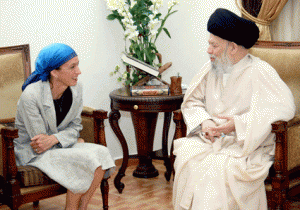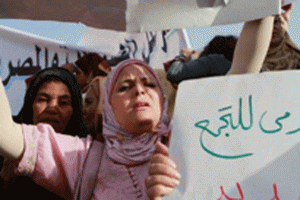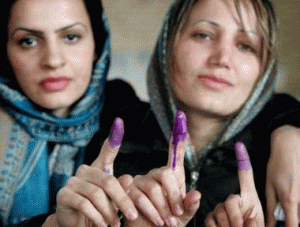1 May 2013 | Uncategorized
Preliminary research from a survey of nearly 10,000 Arab respondents has found that while most support the right to free expression online, they are apt to believe that the internet should be regulated, according to the researchers.
The survey — a joint effort between researchers at the Qatar campus of the US-based Northwestern University and the World Internet Project — explored media usage in the Arab world. Participants were drawn from eight Arab nations: Egypt, Tunisia, Bahrain, Qatar, Saudi Arabia, Jordan, Lebanon and the United Arab Emirates.
The survey questioned participants’ perceptions of the news media, finding that 61 per cent thought the “quality of news reporting in the Arab world has improved over the past two years.” Media credibility declined in countries that experienced revolutions during the Arab Spring. The Saudi Arabian respondents gave their media outlets high marks with 71 [per cent agreeing with the statement, “The media in your country can report the news independently without interference from officials”.
Overall, the survey found high Facebook penetration among respondents who used social media. Ninety-four percent of the social media users had Facebook accounts, 47 per cent used Twitter and 40 per cent used Facebook. Among the Bahrain social media users, 92 per cent had a Facebook account, while just 29 per cent of the Egyptian respondents did.
The survey aimed to assess the use of media — TV, radio, newspapers, books, web — and levels of trust respondents had toward the sources. It also sought to guage how the respondents used the internet to communicate and conduct transactions like banking or purchases.
The results can be accessed at Arab Media Use Study.
31 Jan 2013 | Uncategorized
A woman who said she was raped by state security forces and the journalist who interviewed her were charged by police on 29 January in Somalia. Journalist Abdiaziz Abdinur Ibrahim could face four years imprisonment for insulting a government body and two years for inducing false evidence. Abdiaziz has been charged with insulting a government body, simulating a criminal offence and making a false accusation. The alleged rape victim’s husband and two others who introduced her to the journalist were charged with assisting her to secure a profit for the rape allegation and assisting her to evade investigation. The sentences are five and four year terms respectively. The next hearing will be held on 2 February. Abdiaziz had interviewed the woman on 8 January after she said she was raped by soldiers at a displaced persons camp in Mogadishu. He was detained by the Central Investigations Department of the police two days later.

Non-thinker (2012) by Aida Makoto – A less controversial piece from the Japanese artist
The New York Times has claimed it was hacked by Chinese officials over a period of four months. The attacks are thought to have come from hackers connected to the military in a possible retaliation to a series of stories run by the newspaper — alluding to the vast wealth accumulated by premier of the state council Wen Jiabao. The hackers entered into the Times’s systems, accessing information on the personal computers of 53 employees, including China correspondents. Mandiant, an internet security company hired by the newspaper on 7 November, said the attacks were likely to have been part of a spy campaign, after discovering that the computers used for the attacks were the same used for Chinese military attacks on US military contractors in the past. Hackers began attacking the Times on 13 September, around the time the Wen Jiabao story was in its final pre-publishing stages.
A former policeman in the Ukraine has been sentenced to life in prison for the murder of an investigative journalist, it was reported on 30 January. Oleksiy Pukache was the fourth person to be charged with the murder of Georgiy Gongadze, after his dismembered body was discovered in 2000. The other three were sentenced to 12 and 13 years. As Pukache was sentenced, he announced that equal blame for the murder should be placed on the country’s former president Leonid Kuchma and then presidential chief of staff Volodymyr Lytvyn.
Gongadze’s headless body was found in the woods six weeks after he was kidnapped in Kiev — a case which caused huge demonstrations and helped prompt the 2004 Orange Revolution. A lawsuit taken out against Kuchma in March 2011 was dismissed when prosecutors deemed it unlawful.
A Chinese man who was sent to a labour camp for making a joke about politician Bo Xilai has received minor damages after his compensation appeal was rejected. Fang Hong was sentenced to re-education for a year in 2011 for posting a poem online mocking the disgraced politician and his then police chief Wang Lijun. Chongqing’s Dianjiang county court rejected Fang’s request for around £37,400 in psychological damages, instead offering him just over £5,800, as well as rejecting his appeal for a public apology. This was the first known case of officials compensating for Bo-era abuses. Fang said he would ask his lawyers about appealing the ruling, but critics said his initial appeal was rejected to prevent a stream of further claims. Fang was freed in 2012 following the fall of Bo — whose wife Gu Kailai was convicted of the murder of British Businessman Neil Heywood in November 2011.
An art exhibition in Japan depicting cannibalism and Sadomasochism has prompted a debate over artistic freedom of expression. Aida Makoto’s Monument for Nothing exhibition at the Mori Art Museum in Tokyo on 29 January caused protests from Japanese organisation People Against Pornography and Sexual Violence, who wrote to museum director Nanjo Fumio to demand Makoto’s work be removed. Some of the artists pieces, depicted a giant blender filled with naked women, as well as Japanese pensioners playing croquet with severed heads. Makoto is said to use pornography to prompt people to look beneath Japan’s calm exterior and examine the darker elements of Japanese culture.
3 Dec 2012 | Middle East and North Africa, News
Annette Fisher interviews FRANCES GUY, Senior Adviser on the Middle East at the Foreign and Commonwealth Office and former British Ambassador to Lebanon and Yemen.

Francis Guy meets with Mohammed Hussein Fadlallah
LONDON (INDEX). — Outspoken and sometimes controversial, Frances Guy public profile rose when she was forced to apologise for lauding Lebanon’s Grand Ayatollah Mohammed Hussein Fadlallah after his death in 2010. The White House had branded the Shia cleric “a terrorist” and the Foreign Office said that Guy’s internet posting praising Fadlallah as a “true man of religion” had been removed “after mature consideration”.
Index on Censorship sat with her to discuss the dilemmas of public service and free speech, as well as her vast experience in the Middle East and the challenges women face in that region.
INDEX: You have spoken about the importance of a free press and have actively supported journalists who have been threatened or imprisoned by their governments. How do you see the state of the free press in the Middle East in 2012?
FRANCES GUY: I cannot speak for all of the region but generally this is a good moment for press freedom in the Middle East. In fact, the advent of satellite television had already made it hard for dictatorial regimes to suppress all alternative sources of information. Al Jazeera was a breath of fresh air, not only to those limited by CNN’s version of world news, but also to all those whose only news came from state controlled television, radio and newspapers. I understand the press in Tunisia is effervescent in its reaction to so many years of uniformity and I know that every night in Baghdad I have a choice of more than 20 Iraqi TV stations to choose from.
All is not perfect of course and the counter-balance to releasing the lid on heavily censored press is to ensure responsible reporting. In Lebanon reporting was not always reliable, so while the press is relatively free there is scope for improving the quality of reporting.
The crisis in Syria has thrown open a new debate on what is information and how you can guarantee its’ authenticity. When access to outside journalists is so severely limited, unbiased reporting is almost impossible. One side’s truth becomes the other side’s lies. Access to the internet makes everyone a potential reporter but verification becomes ever more important.
INDEX: During your postings as Her Majesty’s representative in Yemen and Lebanon, you spoke passionately on greater freedoms for women and lesbian, gay, bisexual, and transgender (LGBT) citizens in those countries and the region. What do you think governments in these countries could realistically do to increase freedoms for these groups?
FG: One of the issues that shapes public perception is image. There is a debate going on in Iraq at the moment instigated by the women’s journalists association about the image of women in the press; whether it is in Egyptian or Turkish soap operas, where the women are often second class citizens, the brunt of jokes, or reduced to playing supporting roles or whether it is about air time given to women politicians. If governments wanted to improve the status of marginalised groups in society they can ensure that their own spokespeople are from these marginalised groups. Governments can lead by example by nominating women to office where they will have constant media exposure.

A protest for International Women’s Day in Egypt
Ending discriminatory laws would also help. Relatively simple acts like ensuring gender neutral language in the constitution can play a very important role. In Arabic nouns can be male or female. Some (men) argue that because common practice is that the plural male form in Arabic of e.g. the word citizens is assumed to include men and women then it is acceptable to have only the male form referred to in a constitution. But this leaves a legal ambiguity which can be exploited. It would be so easy to simply include the male and female forms in such texts or to make an explanatory note in every law explaining that the use of the masculine form is used in the sense of men and women on an equal basis without prejudice. I am not sure that any Arab state has done this.
Freedom of expression for LGBT citizens is regrettably even more problematic, but if governments could be persuaded to uphold the neutrality of rights enshrined in constitutions that would go a long way to ensuring those rights are truly applied to all.
INDEX: While you represented the British government, you blogged about matters of interest to you and to the British government. Over the past year, the media has questioned appropriateness of British foreign office representatives using social media as a tool of diplomacy. What are your thoughts?
FG: I think it might have been William Hague who said that there is an inherent contradiction between writing a readable/interesting blog and being a mouthpiece for government. I found it difficult to find something worth writing that did not betray confidences or risked upsetting someone. I therefore often wrote about subjects other than politics; the life cycle of the cedar tree, for example. But that is difficult to sustain.
I enjoyed blogging, and the experiment brought me into contact with groups I would never have met otherwise; bloggers in Lebanon who had been imprisoned for their views, for example. Who talks about them? And the LGBT community, similarly sidelined and oppressed. I think the bigger question is about transparency in government. If you believe that better government is open and transparent government then diplomats should be blogging.
INDEX: What limits on the freedom to express yourself did you encounter while you were an Ambassador?
PG: An Ambassador is always an ambassador 24 hours a day. You are judged as being Her Majesty’s Representative, not as an individual. Inevitably, there can be a tension between what you believe as an individual and what you are asked to say on behalf of your government. Even off the record you are an official representative. But that is part of the job and understood as such. If anything, the UN is often even more cautious, because it is formed of member states, i.e. governments so it is wary of criticising openly its members.
INDEX: You have spoken in the past about “freedom with responsibility”, could you elaborate?
PG: I am not sure of the context of the quote, but I am fairly sure that my intention would have been aimed at some irresponsible sections of the media, who do not verify information and who can (perhaps sometimes deliberately) put people’s lives in danger by stating unproven accusations as fact. Some Lebanese journalists are guilty of this, as indeed were many Ethiopians when I served there. The responsibility is to the truth but also to being conscious of the implications of printing/publicising some facts and not others. The British press is clearly not immune to a similar discussion — just because you can do something in the name of freedom of expression does not mean that you have to do it.
INDEX: Having served on the British government, you will be aware of accusations of hypocrisy when countries like the UK lecture other governments about their human rights records when the UK hasn’t “sorted out its own backyard”. What has been your reaction to these accusations?
FG: “Our own backyard” was less of a problem than our failure (as my interlocutors would see it) to deal with crimes that our politicians and armies had committed overseas. There were awkward moments though, when e.g. you are supporting quotas for women as a way to make progress in women’s representation in Parliament, when your own country under successive governments has not introduced quotas and has generally been wary of any kind of positive discrimination. My reaction though was always that freedom of expression, including in the ability to vote out your government if you disagree with it, guarantees a sound level of public debate about all issues.

Women having voted in Iraq
INDEX: You have recently taken up your post with UN Women in Iraq. What freedom of expression issues have you encountered since you arrived?
FG: I have attended was about the image of women in the media and how that can cement social perceptions. The challenge is to get Iraqi TV to show different kinds of women, playing different roles on screen. I am impressed with some of the phone-in programmes on radio which allow citizens to voice their frustrations with the failure of the state to deliver public services. In itself they will not change very much but it does mean that no politician can pretend that they don’t know what the issues are. For a state that was famous for its tyranny of expression, it is refreshing to find people so willing to express their views publicly.
INDEX: What do you see as the key battle grounds for free expression in the next five years?
FG: Five years is a long time in today’s fast moving media scene. For the next months, I think the issue of so-called citizen’s journalists, and immediate access to YouTube etc, will continue to be paramount. What moral limits are there on what should be accessible? Who decides? Can governments’ prevent documents being uploaded on YouTube? Do YouTube, Google etc have some moral parameters – should executions be so readily accessible? And for women, the debate on images of women, including the increasing accessibility of pornographic images will also continue. I think I will put on my wall the pictures of women weight lifters at the Olympic Games… what power and majesty (and defiance).
Annette Fisher is an international development professional based in London




